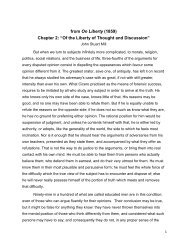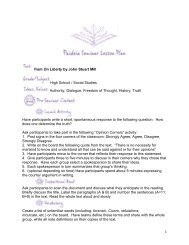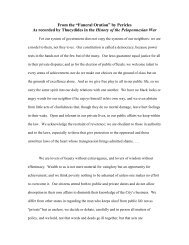Rousseau_contrat-social
Create successful ePaper yourself
Turn your PDF publications into a flip-book with our unique Google optimized e-Paper software.
others, provided the contract is not infringed by them; for in relation<br />
to what is external to it, it becomes a simple being, an individual.<br />
But the body politic or the Sovereign, drawing its being wholly from the<br />
sanctity of the contract, can never bind itself, even to an outsider, to<br />
do anything derogatory to the original act, for instance, to alienate<br />
any part of itself, or to submit to another Sovereign. Violation of the<br />
act by which it exists would be self-annihilation; and that which is<br />
itself nothing can create nothing.<br />
As soon as this multitude is so united in one body, it is impossible to<br />
offend against one of the members without attacking the body, and still<br />
more to offend against the body without the members resenting it. Duty<br />
and interest therefore equally oblige the two contracting parties to<br />
give each other help; and the same men should seek to combine, in their<br />
double capacity, all the advantages dependent upon that capacity.<br />
Again, the Sovereign, being formed wholly of the individuals who compose<br />
it, neither has nor can have any interest contrary to theirs; and<br />
consequently the sovereign power need give no guarantee to its subjects,<br />
because it is impossible for the body to wish to hurt all its members.<br />
We shall also see later on that it cannot hurt any in particular. The<br />
Sovereign, merely by virtue of what it is, is always what it should be.<br />
This, however, is not the case with the relation of the subjects to the<br />
Sovereign, which, despite the common interest, would have no security<br />
that they would fulfil their undertakings, unless it found means to<br />
assure itself of their fidelity.<br />
In fact, each individual, as a man, may have a particular will contrary<br />
or dissimilar to the general will which he has as a citizen. His<br />
particular interest may speak to him quite differently from the common<br />
interest: his absolute and naturally independent existence may make him<br />
look upon what he owes to the common cause as a gratuitous contribution,<br />
the loss of which will do less harm to others than the payment of it is<br />
burdensome to himself; and, regarding the moral person which constitutes<br />
the State as a persona ficta, because not a man, he may wish to enjoy<br />
13











